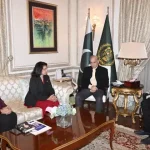KABUL: Taliban officials are attempting to eliminate “un-Islamic” and anti-government material from circulation by circulating lists of prohibited titles, inspecting imported books, and deleting texts from libraries.
A commission under the Ministry of Information and Culture spearheads the initiatives shortly after the Taliban took power in 2021 and imposed their rigid interpretation of sharia, or Islamic law.
The ministry declared in October that 400 books “that conflicted with Islamic and Afghan values, most of which have been collected from the markets” had been recognized by the commission.
The ministry has not said how many books were taken out, but according to two sources—a Kabul publisher and a government worker—texts were gathered during the first year of Taliban administration and more recently in recent months. “Censorship is widespread. The publisher in Kabul stated, “Working is extremely challenging, and fear has spread everywhere.”
According to him, there were restrictions on books during the previous foreign-backed government that was overthrown by the Taliban due to “a lot of corruption, pressures, and other issues.”
However, he continued, “there was no fear, one could say whatever he or she wanted to say.” “We could speak up regardless of whether we were able to change anything.”
“In opposition to religion”
An information ministry official provided this news agency with a list of five of the prohibited titles. The “counterculture” book “Twilight of the Eastern Gods” by Albanian novelist Ismail Kadare and “Jesus the Son of Man” by well-known Lebanese-American author Khalil Gibran are included because they include “blasphemous expressions.”
The former government’s education minister, Mirwais Balkhi, had his book “Afghanistan and the Region: A West Asian Perspective” prohibited for “negative propaganda.”
Kabul, which had already been devastated by decades of war, had relatively few publishing firms and bookstores during the Taliban’s previous tenure, which lasted from 1996 to 2001.
Through the Islam Qala border crossing in western Herat province, hundreds of books are imported every week from neighboring Iran, which shares the Persian language with Afghanistan.
Last week, Taliban officials searched a shipment’s crates at a customs warehouse in Herat. While another man, dressed in a camouflage outfit with a man’s likeness on the shoulder patch, looked through the books for images of humans and animals, another man flipped through a hefty English-language volume.
According to Mohammad Sediq Khademi, a representative with the Herat department for the Propagation of Virtue and the Prevention of Vice (PVPV), “We have not banned books from any particular country or person, but we study the books and we block those that are contradictory to religion, sharia, or the government, or if they have photos of living things.”
The 38-year-old added that the assessments of imported books had begun around three months prior. “Any books that are against religion, faith, sect, or sharia … we will not allow them,” he stated.
According to a retailer who asked to remain anonymous, some publications, including Afghan author Yaqub Mashauf’s “The History of Jihadi Groups in Afghanistan,” have been taken out of Herat libraries and Kabul bookstores.








